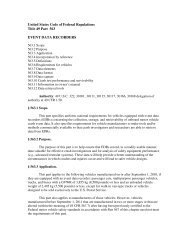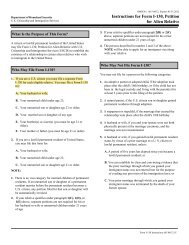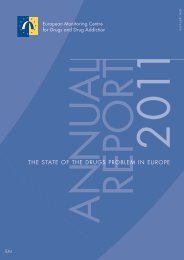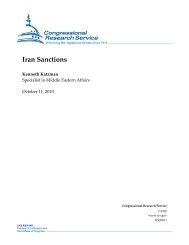- Page 1:
MANAGING THE RISKS OF EXTREMEEVENTS
- Page 5 and 6:
Managing the Risks of Extreme Event
- Page 7:
ContentsSection IForeword .........
- Page 10 and 11:
ForewordForewordThis Special Report
- Page 12 and 13:
Prefacein understanding and managin
- Page 16 and 17:
Summary for PolicymakersA.ContextTh
- Page 18 and 19:
Summary for PolicymakersFigure SPM.
- Page 20 and 21:
Summary for Policymakerssettlements
- Page 22 and 23:
Summary for PolicymakersC.Disaster
- Page 24 and 25:
Summary for Policymakers20103146957
- Page 26 and 27:
Summary for Policymakers50201053W.
- Page 28 and 29:
Summary for PolicymakersOscillation
- Page 30 and 31:
Summary for PolicymakersTable SPM.1
- Page 32 and 33:
Summary for Policymakersimportance
- Page 34 and 35:
Summary for Policymakers22
- Page 37 and 38:
1Climate Change:New Dimensions inDi
- Page 39 and 40:
Chapter 1Climate Change: New Dimens
- Page 41 and 42:
Chapter 1Climate Change: New Dimens
- Page 43 and 44:
Chapter 1Climate Change: New Dimens
- Page 45 and 46:
Chapter 1Climate Change: New Dimens
- Page 47 and 48:
Chapter 1Climate Change: New Dimens
- Page 49 and 50:
Chapter 1Climate Change: New Dimens
- Page 51 and 52:
Chapter 1Climate Change: New Dimens
- Page 53 and 54:
Chapter 1Climate Change: New Dimens
- Page 55 and 56:
Chapter 1Climate Change: New Dimens
- Page 57 and 58:
Chapter 1Climate Change: New Dimens
- Page 59 and 60:
Chapter 1Climate Change: New Dimens
- Page 61 and 62:
Chapter 1Climate Change: New Dimens
- Page 63 and 64:
Chapter 1Climate Change: New Dimens
- Page 65 and 66:
Chapter 1Climate Change: New Dimens
- Page 67 and 68:
Chapter 1Climate Change: New Dimens
- Page 69 and 70:
Chapter 1Climate Change: New Dimens
- Page 71 and 72:
Chapter 1Climate Change: New Dimens
- Page 73 and 74:
Chapter 1Climate Change: New Dimens
- Page 75 and 76:
Chapter 1Climate Change: New Dimens
- Page 77 and 78:
2Determinantsof Risk:Exposure and V
- Page 79 and 80:
Chapter 2Determinants of Risk: Expo
- Page 81 and 82:
Chapter 2Determinants of Risk: Expo
- Page 83 and 84:
Chapter 2Determinants of Risk: Expo
- Page 85 and 86:
Chapter 2Determinants of Risk: Expo
- Page 87 and 88:
Chapter 2Determinants of Risk: Expo
- Page 89 and 90:
Chapter 2Determinants of Risk: Expo
- Page 91 and 92:
Chapter 2Determinants of Risk: Expo
- Page 93 and 94:
Chapter 2Determinants of Risk: Expo
- Page 95 and 96:
Chapter 2Determinants of Risk: Expo
- Page 97 and 98:
Chapter 2Determinants of Risk: Expo
- Page 99 and 100:
Chapter 2Determinants of Risk: Expo
- Page 101 and 102:
Chapter 2Determinants of Risk: Expo
- Page 103 and 104:
Chapter 2Determinants of Risk: Expo
- Page 105 and 106:
Chapter 2Determinants of Risk: Expo
- Page 107 and 108:
Chapter 2Determinants of Risk: Expo
- Page 109 and 110:
Chapter 2Determinants of Risk: Expo
- Page 111 and 112:
Chapter 2Determinants of Risk: Expo
- Page 113 and 114:
Chapter 2Determinants of Risk: Expo
- Page 115 and 116:
Chapter 2Determinants of Risk: Expo
- Page 117 and 118:
Chapter 2Determinants of Risk: Expo
- Page 119 and 120:
Chapter 2Determinants of Risk: Expo
- Page 121 and 122:
3Changesin Climate Extremesand thei
- Page 123 and 124:
Chapter 3Changes in Climate Extreme
- Page 125 and 126:
Chapter 3Changes in Climate Extreme
- Page 127 and 128:
Chapter 3Changes in Climate Extreme
- Page 129 and 130:
Chapter 3Changes in Climate Extreme
- Page 131 and 132:
Chapter 3Changes in Climate Extreme
- Page 133 and 134:
Chapter 3Changes in Climate Extreme
- Page 135 and 136:
Chapter 3Changes in Climate Extreme
- Page 137 and 138:
Chapter 3Changes in Climate Extreme
- Page 139 and 140:
Chapter 3Changes in Climate Extreme
- Page 141 and 142:
Chapter 3Changes in Climate Extreme
- Page 143 and 144:
Chapter 3Changes in Climate Extreme
- Page 145 and 146:
Chapter 3Changes in Climate Extreme
- Page 147 and 148:
Chapter 3Changes in Climate Extreme
- Page 149 and 150:
137in annual extremes (20-year extr
- Page 151 and 152:
Chapter 3Changes in Climate Extreme
- Page 153 and 154:
Chapter 3Changes in Climate Extreme
- Page 155 and 156:
Chapter 3Changes in Climate Extreme
- Page 157 and 158:
Chapter 3Changes in Climate Extreme
- Page 159 and 160:
Chapter 3Changes in Climate Extreme
- Page 161 and 162:
Chapter 3Changes in Climate Extreme
- Page 163 and 164:
Chapter 3Changes in Climate Extreme
- Page 165 and 166:
Chapter 3Changes in Climate Extreme
- Page 167 and 168:
Chapter 3Changes in Climate Extreme
- Page 169 and 170:
Chapter 3Changes in Climate Extreme
- Page 171 and 172:
Chapter 3Changes in Climate Extreme
- Page 173 and 174:
Chapter 3Changes in Climate Extreme
- Page 175 and 176:
Chapter 3Changes in Climate Extreme
- Page 177 and 178:
Chapter 3Changes in Climate Extreme
- Page 179 and 180:
Chapter 3Changes in Climate Extreme
- Page 181 and 182:
Chapter 3Changes in Climate Extreme
- Page 183 and 184:
Chapter 3Changes in Climate Extreme
- Page 185 and 186:
Chapter 3Changes in Climate Extreme
- Page 187 and 188:
Chapter 3Changes in Climate Extreme
- Page 189 and 190:
Chapter 3Changes in Climate Extreme
- Page 191 and 192:
Chapter 3Changes in Climate Extreme
- Page 193 and 194:
Chapter 3Changes in Climate Extreme
- Page 195 and 196:
Chapter 3Changes in Climate Extreme
- Page 197 and 198:
Chapter 3Changes in Climate Extreme
- Page 199 and 200:
Chapter 3Changes in Climate Extreme
- Page 201 and 202:
Chapter 3Changes in Climate Extreme
- Page 203 and 204:
Chapter 3Changes in Climate Extreme
- Page 205 and 206:
Chapter 3Changes in Climate Extreme
- Page 207 and 208:
Chapter 3Changes in Climate Extreme
- Page 209 and 210:
Chapter 3Changes in Climate Extreme
- Page 211 and 212:
Chapter 3Changes in Climate Extreme
- Page 213 and 214:
Chapter 3Changes in Climate Extreme
- Page 215 and 216:
Chapter 3Changes in Climate Extreme
- Page 217 and 218:
Chapter 3Changes in Climate Extreme
- Page 219 and 220:
Chapter 3Changes in Climate Extreme
- Page 221 and 222:
Chapter 3Changes in Climate Extreme
- Page 223 and 224:
Chapter 3Changes in Climate Extreme
- Page 225 and 226:
Chapter 3Changes in Climate Extreme
- Page 227 and 228:
Chapter 3Changes in Climate Extreme
- Page 229 and 230:
Chapter 3Changes in Climate Extreme
- Page 231 and 232: Chapter 3Changes in Climate Extreme
- Page 233 and 234: Chapter 3Changes in Climate Extreme
- Page 235 and 236: Chapter 3Changes in Climate Extreme
- Page 237 and 238: Chapter 3Changes in Climate Extreme
- Page 239 and 240: Chapter 3Changes in Climate Extreme
- Page 241 and 242: Chapter 3Changes in Climate Extreme
- Page 243 and 244: 4Changesin Impactsof Climate Extrem
- Page 245 and 246: Chapter 4Changes in Impacts of Clim
- Page 247 and 248: Chapter 4Changes in Impacts of Clim
- Page 249 and 250: Chapter 4Changes in Impacts of Clim
- Page 251 and 252: Chapter 4Changes in Impacts of Clim
- Page 253 and 254: Chapter 4Changes in Impacts of Clim
- Page 255 and 256: Chapter 4Changes in Impacts of Clim
- Page 257 and 258: Chapter 4Changes in Impacts of Clim
- Page 259 and 260: Chapter 4Changes in Impacts of Clim
- Page 261 and 262: Chapter 4Changes in Impacts of Clim
- Page 263 and 264: Chapter 4Changes in Impacts of Clim
- Page 265 and 266: Chapter 4Changes in Impacts of Clim
- Page 267 and 268: Chapter 4Changes in Impacts of Clim
- Page 269 and 270: Chapter 4Changes in Impacts of Clim
- Page 271 and 272: Chapter 4Changes in Impacts of Clim
- Page 273 and 274: Chapter 4Changes in Impacts of Clim
- Page 275 and 276: Chapter 4Changes in Impacts of Clim
- Page 277 and 278: Chapter 4Changes in Impacts of Clim
- Page 279 and 280: Chapter 4Changes in Impacts of Clim
- Page 281: Chapter 4Changes in Impacts of Clim
- Page 285 and 286: Chapter 4Changes in Impacts of Clim
- Page 287 and 288: Chapter 4Changes in Impacts of Clim
- Page 289 and 290: Chapter 4Changes in Impacts of Clim
- Page 291 and 292: Chapter 4Changes in Impacts of Clim
- Page 293 and 294: Chapter 4Changes in Impacts of Clim
- Page 295 and 296: Chapter 4Changes in Impacts of Clim
- Page 297 and 298: Chapter 4Changes in Impacts of Clim
- Page 299 and 300: Chapter 4Changes in Impacts of Clim
- Page 301 and 302: Chapter 4Changes in Impacts of Clim
- Page 303 and 304: 5Managingthe Risksfrom Climate Extr
- Page 305 and 306: Chapter 5Managing the Risks from Cl
- Page 307 and 308: Chapter 5Managing the Risks from Cl
- Page 309 and 310: Chapter 5Managing the Risks from Cl
- Page 311 and 312: Chapter 5Managing the Risks from Cl
- Page 313 and 314: Chapter 5Managing the Risks from Cl
- Page 315 and 316: Chapter 5Managing the Risks from Cl
- Page 317 and 318: Chapter 5Managing the Risks from Cl
- Page 319 and 320: Chapter 5Managing the Risks from Cl
- Page 321 and 322: Chapter 5Managing the Risks from Cl
- Page 323 and 324: Chapter 5Managing the Risks from Cl
- Page 325 and 326: Chapter 5Managing the Risks from Cl
- Page 327 and 328: Chapter 5Managing the Risks from Cl
- Page 329 and 330: Chapter 5Managing the Risks from Cl
- Page 331 and 332: Chapter 5Managing the Risks from Cl
- Page 333 and 334:
Chapter 5Managing the Risks from Cl
- Page 335 and 336:
Chapter 5Managing the Risks from Cl
- Page 337 and 338:
Chapter 5Managing the Risks from Cl
- Page 339 and 340:
Chapter 5Managing the Risks from Cl
- Page 341 and 342:
Chapter 5Managing the Risks from Cl
- Page 343 and 344:
Chapter 5Managing the Risks from Cl
- Page 345 and 346:
Chapter 5Managing the Risks from Cl
- Page 347 and 348:
Chapter 5Managing the Risks from Cl
- Page 349 and 350:
Chapter 5Managing the Risks from Cl
- Page 351 and 352:
6National Systemsfor Managing the R
- Page 353 and 354:
Chapter 6National Systems for Manag
- Page 355 and 356:
Chapter 6National Systems for Manag
- Page 357 and 358:
Chapter 6National Systems for Manag
- Page 359 and 360:
Chapter 6National Systems for Manag
- Page 361 and 362:
Chapter 6National Systems for Manag
- Page 363 and 364:
Chapter 6National Systems for Manag
- Page 365 and 366:
Chapter 6National Systems for Manag
- Page 367 and 368:
Chapter 6National Systems for Manag
- Page 369 and 370:
Chapter 6National Systems for Manag
- Page 371 and 372:
Chapter 6National Systems for Manag
- Page 373 and 374:
Chapter 6National Systems for Manag
- Page 375 and 376:
Chapter 6National Systems for Manag
- Page 377 and 378:
Chapter 6National Systems for Manag
- Page 379 and 380:
Chapter 6National Systems for Manag
- Page 381 and 382:
Chapter 6National Systems for Manag
- Page 383 and 384:
Chapter 6National Systems for Manag
- Page 385 and 386:
Chapter 6National Systems for Manag
- Page 387 and 388:
Chapter 6National Systems for Manag
- Page 389 and 390:
Chapter 6National Systems for Manag
- Page 391 and 392:
Chapter 6National Systems for Manag
- Page 393 and 394:
Chapter 6National Systems for Manag
- Page 395 and 396:
Chapter 6National Systems for Manag
- Page 397 and 398:
Chapter 6National Systems for Manag
- Page 399 and 400:
Chapter 6National Systems for Manag
- Page 401 and 402:
Chapter 6National Systems for Manag
- Page 403 and 404:
Chapter 6National Systems for Manag
- Page 405 and 406:
7Managingthe Risks:International Le
- Page 407 and 408:
Chapter 7Managing the Risks: Intern
- Page 409 and 410:
Chapter 7Managing the Risks: Intern
- Page 411 and 412:
Chapter 7Managing the Risks: Intern
- Page 413 and 414:
Chapter 7Managing the Risks: Intern
- Page 415 and 416:
Chapter 7Managing the Risks: Intern
- Page 417 and 418:
Chapter 7Managing the Risks: Intern
- Page 419 and 420:
Chapter 7Managing the Risks: Intern
- Page 421 and 422:
Chapter 7Managing the Risks: Intern
- Page 423 and 424:
Chapter 7Managing the Risks: Intern
- Page 425 and 426:
Chapter 7Managing the Risks: Intern
- Page 427 and 428:
Chapter 7Managing the Risks: Intern
- Page 429 and 430:
Chapter 7Managing the Risks: Intern
- Page 431 and 432:
Chapter 7Managing the Risks: Intern
- Page 433 and 434:
Chapter 7Managing the Risks: Intern
- Page 435 and 436:
Chapter 7Managing the Risks: Intern
- Page 437 and 438:
Chapter 7Managing the Risks: Intern
- Page 439 and 440:
Chapter 7Managing the Risks: Intern
- Page 441 and 442:
Chapter 7Managing the Risks: Intern
- Page 443 and 444:
Chapter 7Managing the Risks: Intern
- Page 445 and 446:
Chapter 7Managing the Risks: Intern
- Page 447 and 448:
Chapter 7Managing the Risks: Intern
- Page 449 and 450:
8Towarda Sustainableand Resilient F
- Page 451 and 452:
Chapter 8Toward a Sustainable and R
- Page 453 and 454:
Chapter 8Toward a Sustainable and R
- Page 455 and 456:
Chapter 8Toward a Sustainable and R
- Page 457 and 458:
Chapter 8Toward a Sustainable and R
- Page 459 and 460:
Chapter 8Toward a Sustainable and R
- Page 461 and 462:
Chapter 8Toward a Sustainable and R
- Page 463 and 464:
Chapter 8Toward a Sustainable and R
- Page 465 and 466:
Chapter 8Toward a Sustainable and R
- Page 467 and 468:
Chapter 8Toward a Sustainable and R
- Page 469 and 470:
Chapter 8Toward a Sustainable and R
- Page 471 and 472:
Chapter 8Toward a Sustainable and R
- Page 473 and 474:
Chapter 8Toward a Sustainable and R
- Page 475 and 476:
Chapter 8Toward a Sustainable and R
- Page 477 and 478:
Chapter 8Toward a Sustainable and R
- Page 479 and 480:
Chapter 8Toward a Sustainable and R
- Page 481 and 482:
Chapter 8Toward a Sustainable and R
- Page 483 and 484:
Chapter 8Toward a Sustainable and R
- Page 485 and 486:
Chapter 8Toward a Sustainable and R
- Page 487 and 488:
Chapter 8Toward a Sustainable and R
- Page 489 and 490:
Chapter 8Toward a Sustainable and R
- Page 491 and 492:
Chapter 8Toward a Sustainable and R
- Page 493 and 494:
Chapter 8Toward a Sustainable and R
- Page 495 and 496:
Chapter 8Toward a Sustainable and R
- Page 497 and 498:
Chapter 8Toward a Sustainable and R
- Page 499 and 500:
9 Case StudiesCoordinating Lead Aut
- Page 501 and 502:
Chapter 9Case StudiesExecutive Summ
- Page 503 and 504:
Chapter 9Case StudiesTable 9-1 | Ma
- Page 505 and 506:
Chapter 9Case Studiesbecause heat-r
- Page 507 and 508:
Chapter 9Case Studiesneed for other
- Page 509 and 510:
Chapter 9Case StudiesAustralian coa
- Page 511 and 512:
Chapter 9Case Studiesthat 1.3 milli
- Page 513 and 514:
Chapter 9Case Studies• Iron dzud:
- Page 515 and 516:
Chapter 9Case Studiesof impact. Bas
- Page 517 and 518:
Chapter 9Case StudiesTropical cyclo
- Page 519 and 520:
Chapter 9Case Studies9.2.6.5. Outco
- Page 521 and 522:
Chapter 9Case Studieswith increased
- Page 523 and 524:
Chapter 9Case StudiesThe developmen
- Page 525 and 526:
Chapter 9Case StudiesSuch devastati
- Page 527 and 528:
Chapter 9Case Studiesbuildings have
- Page 529 and 530:
Chapter 9Case Studies• Wind defle
- Page 531 and 532:
Chapter 9Case Studiesdeveloped, som
- Page 533 and 534:
Chapter 9Case Studiesbeen establish
- Page 535 and 536:
Chapter 9Case StudiesTable 9-3 | Ex
- Page 537 and 538:
Chapter 9Case Studieswhile they pro
- Page 539 and 540:
Chapter 9Case Studiesexperiential l
- Page 541 and 542:
Chapter 9Case StudiesThe Philippine
- Page 543 and 544:
Chapter 9Case StudiesBeg, N., J.C.
- Page 545 and 546:
Chapter 9Case StudiesFlyvbjerg, B.,
- Page 547 and 548:
Chapter 9Case StudiesJeuland, M. an
- Page 549 and 550:
Chapter 9Case StudiesMétéo France
- Page 551 and 552:
Chapter 9Case StudiesRepublic of So
- Page 553 and 554:
Chapter 9Case StudiesUNESC, 2000: A
- Page 555:
IV Annexes I to IV
- Page 558 and 559:
Authors and Expert ReviewersAnnex I
- Page 560 and 561:
Authors and Expert ReviewersAnnex I
- Page 562 and 563:
Authors and Expert ReviewersAnnex I
- Page 564 and 565:
Authors and Expert ReviewersAnnex I
- Page 566 and 567:
Authors and Expert ReviewersAnnex I
- Page 568 and 569:
Glossary of TermsAnnex IIAbrupt cli
- Page 570 and 571:
Glossary of TermsAnnex IIor anthrop
- Page 572 and 573:
Glossary of TermsAnnex IIFrozen gro
- Page 574 and 575:
Glossary of TermsAnnex IIand time s
- Page 576 and 577:
Glossary of TermsAnnex IImain track
- Page 578 and 579:
AcronymsAnnex IIIAAO Antarctic Osci
- Page 580 and 581:
AcronymsAnnex III568
- Page 582 and 583:
List of Major IPCC ReportsAnnex IVC
- Page 584 and 585:
List of Major IPCC ReportsAnnex IV5
- Page 586 and 587:
IndexIndex | KeyTerms defined in th
- Page 588 and 589:
IndexDemographic changes, 80, 234-2
- Page 590 and 591:
Indexregional impacts, 259vulnerabi
- Page 592 and 593:
IndexOcean acidification, 185, 261O
- Page 594:
Indextipping points, 122, 351, 458-










